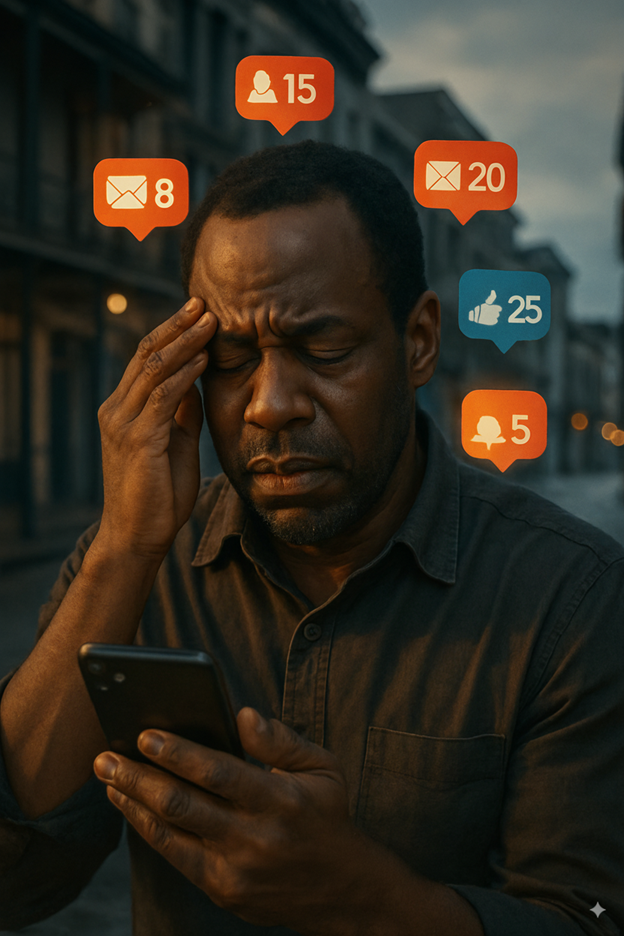Remember when the biggest interruption to your day was a phone call during dinner? Now we’re checking our phones every 12 minutes, scrolling through endless feeds of other people’s highlight reels, and wondering why we feel more anxious than ever before.
If you’ve ever put your phone down after an hour of scrolling and felt somehow worse than when you picked it up, you’re not alone. Social media was supposed to connect us, but for many folks right here in New Orleans, it’s become another source of stress in an already stressful world.
The Real Cost of Constant Connection
Here’s what’s really happening when you’re glued to your screen: your brain is getting hit with more information in one day than your great-grandparents processed in a month. Every notification triggers a small stress response. Every controversial post activates your fight-or-flight system. And every comparison to someone else’s vacation photos or success stories chips away at your peace of mind.
Research shows that heavy social media use can increase symptoms of depression and anxiety, especially when we’re constantly comparing our behind-the-scenes reality to everyone else’s carefully curated performances. And let’s be real – as Black folks, we’re often dealing with the added stress of seeing traumatic news about our community every time we open an app.
When Your Phone Becomes a Window to Trauma
Social media can feel like a never-ending news cycle of pain. Videos of police brutality, stories of injustice, heated political arguments – all mixed in with your cousin’s baby photos and your friend’s wedding pictures. Your nervous system doesn’t know how to process this constant emotional whiplash.
Many people feel guilty about taking breaks from social justice content, thinking they need to stay informed and engaged at all times. But here’s the truth: you can’t pour from an empty cup. Taking care of your mental health isn’t selfish – it’s necessary for you to show up as your best self for your family, your community, and the causes you care about.

Signs You Need a Digital Detox
You might need to reassess your relationship with technology if you:
- Reach for your phone first thing in the morning before your feet hit the floor
- Feel phantom vibrations when your phone isn’t even buzzing
- Get anxious when your battery dies or you don’t have Wi-Fi
- Compare your life to what you see on social media and come up feeling inadequate
- Lose track of time scrolling and realize hours have passed
- Feel overwhelmed by the constant stream of news and opinions
- Have trouble sleeping because you’re scrolling in bed
- Notice your mood gets worse after spending time on certain apps
Digital Detox: Practical Steps for Real Life
Let’s be practical here. You’re not going to throw your phone in Lake Pontchartrain and live off the grid. You need technology for work, staying connected with family, and navigating daily life. But you can create healthier boundaries that protect your peace.
Start Small: The Phone-Free Morning Ritual
Instead of grabbing your phone the moment you wake up, try morning routine:
- Stretch in bed for 30 seconds – feel your body waking up
- Look out your window – notice the weather, the light, maybe some birds
- Take three deep breaths – center yourself before the day begins
- Set an intention – “I choose peace today” or “I’m grateful for this new day” or pray
- Only then reach for your phone
This simple shift helps you start your day from your own center instead of immediately absorbing everyone else’s energy.
Create Sacred Spaces
Designate certain areas of your home as phone-free zones. Maybe the dinner table is for conversation only. Your bedroom is for rest and intimacy, not scrolling. Maybe Sunday morning coffee on the porch is just for you and your thoughts.
The News Diet
Instead of getting news from social media (which is often incomplete, inflammatory, or just plain wrong), choose one trusted news source and check it once a day at a designated time. Yes, staying informed is important, but drowning in a constant stream of outrage and catastrophe isn’t helping anyone.
Curate Your Feeds Like Your Life Depends on It
Because it kind of does. Your mental health is directly affected by what you consume, including digital content. Unfollow accounts that make you feel bad about yourself, angry, or anxious. Mute keywords that trigger you. Follow accounts that inspire, educate, or bring you joy.
If an account consistently makes you feel worse about yourself or the world, it doesn’t matter if it’s your best friend from high school – you have permission to unfollow or mute.
Try This Right Now: The 5-4-3-2-1 Grounding Technique
When you notice you’ve been scrolling mindlessly and feeling overwhelmed, put your phone down and try this:
- 5 things you can see (maybe your coffee cup, a plant, sunlight through the window)
- 4 things you can touch (your chair, your clothes, a soft blanket)
- 3 things you can hear (traffic outside, the air conditioner, birds)
- 2 things you can smell (coffee, someone cooking nearby)
- 1 thing you can taste (maybe the lingering taste of your morning coffee)
This brings you back to your actual life, your actual body, your actual present moment – instead of the endless digital spiral.
Building Real Connection in a Digital World
The irony of social media is that it can make us feel more isolated even when we’re “connected” to hundreds of people. Real connection happens when you put the phone down and have an actual conversation. When you call your grandmother instead of just liking her Facebook posts. When you meet a friend for coffee on instead of just commenting on their pictures.
New Orleans has always been about community, about gathering, about real human connection. Don’t let digital overwhelm steal that from you.
Setting Boundaries That Actually Work
Here are some practical boundaries you can start today:
Time Boundaries:
- No phones during meals
- No scrolling within an hour of bedtime
- Check social media only twice a day at designated times
- Set a timer when you do scroll – maybe 30 minutes max
Content Boundaries:
- Unfollow accounts that consistently stress you out
- Use the “mute” function liberally for triggering topics
- Turn off non-essential notifications
- Create separate accounts for different purposes (personal vs. professional vs. activism)
Physical Boundaries:
- Charge your phone outside your bedroom
- Leave your phone in another room during family time
- Take actual breaks – go for walks without your phone
- Have a basket by the door where everyone puts their phone during family meals
When Digital Detox Becomes Self-Care
Taking breaks from social media isn’t about being uninformed or disconnected. It’s about being intentional with your energy and attention. You’re not required to absorb every piece of information, engage with every argument, or carry the weight of the world’s problems on your shoulders.
Your ancestors survived and thrived without constant digital input. They found ways to stay connected to their communities, stay informed about what mattered, and take care of their families without sacrificing their peace of mind. You can too.
The Ripple Effect
When you start protecting your own digital wellness, it gives others permission to do the same. Your children learn healthy technology habits by watching you. Your friends might feel more comfortable setting their own boundaries. You become part of the solution instead of part of the problem.
Your New Digital Wellness Plan
This week, try choosing just one of these practices:
- Start your morning without immediately checking your phone
- Designate one meal a day as phone-free
- Unfollow three accounts that don’t serve your wellbeing
- Set a timer for social media use
- Take one real-world walk without your phone
Small changes create big shifts over time. You don’t have to overhaul your entire digital life overnight. Just start with one small step toward protecting your peace.
Related: Why So Many Men are Emotionally Unavailable
Remember: you have the right to curate your digital environment just like you would curate your physical environment. You wouldn’t invite someone into your home who constantly stressed you out, criticized you, or filled you with anger and fear. Don’t invite that energy into your mind through your devices either.

